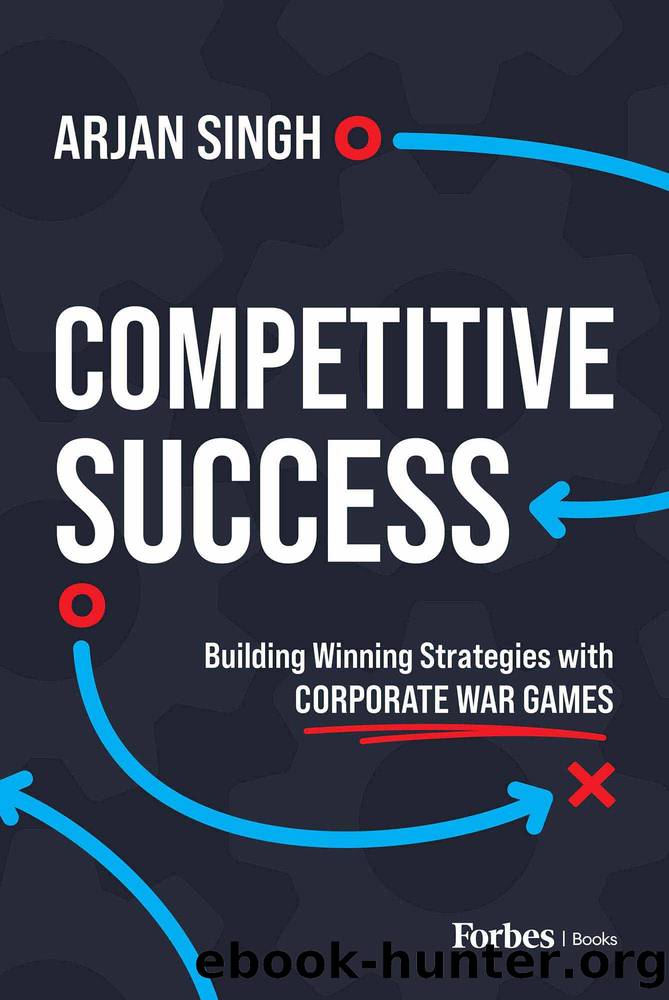Competitive Success by Arjan Singh

Author:Arjan Singh [Singh, Arjan]
Language: eng
Format: epub
Tags: General Fiction
Publisher: Forbes Books
CHALLENGE THE ASSUMPTIONS
When you look at past battles, analyzing and reflecting, avoid making snap decisions about what went wrong or right. If, for example, something didnât work and everyone assumes itâs because of x, when really it was x, y, and z, then youâre not all seeing the whole picture. You donât want to say, âWeâre not going to do that again; it didnât workâ without picking apart the why. You failed because you didnât have the resources, the team wasnât in alignment, you were too late to the market, you used the wrong platform to disseminate this message, your message didnât resonate with the customer, or a combination of all or none of these things.
Timing is also crucial. You might have tried something six years ago and it didnât work out, but that doesnât mean that the same would necessarily hold true today. The competitive environment and ecosystem are always changing and could look very different years later. Thereâs a time and place for innovation, and making sure those different components are in place. Companies struggle with being way ahead of their time, and then they donât go back and try it again because of the risk. You overcome this by laying out the assumptions and asking: What really happened? Why did it happen? What were the conditions that enabled that situation and are things different right now?
REFLECTING BUILDS ORGANIZATIONAL MEMORY
Sometimes companies just donât learn. Theyâll do a war game and never change and soon forget about everything. Five years later, theyâre asking the same questions again. Theyâre surprised when they hear that the issue had been addressed. I call this organizational amnesia, when you find your company asking the same questions over and over again.
Organizational memory is crucial in combating organizational amnesia, and why the exercise in this chapter is fundamental to your business. If we donât remember past battles, then we all know that history repeats itself.
Look at the news cycle in this country. People go through all kinds of emotions when they hear some news, but a week later, theyâve forgotten and moved on to the next thing. We repeat our mistakes. The same thing happens with businesses. When you analyze past battles, you activate your organizational memory. When you dig deep and dive back into the history of whatâs happened in past battles, you build know-how and value.
One of the core advantages of organizational history that established companies enjoy, beyond just the ability to make a product, is their experience and relationships, which take multiple years to build. By reflecting, youâre cementing the value of what you experienced.
If youâve made products that are successful in the marketplace, youâve presumably established suppliers, designers, and other components to help you bring your product to market. As you start running the business, the business to you becomes obvious. But someone new coming in wonât have any of that knowledge. Itâs challenging for them, because they must build that knowledge from scratch. For companies, things that are obvious to them are not obvious to new employees.
Download
This site does not store any files on its server. We only index and link to content provided by other sites. Please contact the content providers to delete copyright contents if any and email us, we'll remove relevant links or contents immediately.
Hit Refresh by Satya Nadella(8344)
The Compound Effect by Darren Hardy(7574)
Change Your Questions, Change Your Life by Marilee Adams(6654)
Nudge - Improving Decisions about Health, Wealth, and Happiness by Thaler Sunstein(6642)
The Black Swan by Nassim Nicholas Taleb(6203)
Daring Greatly by Brene Brown(5651)
Deep Work by Cal Newport(5494)
Principles: Life and Work by Ray Dalio(5333)
Rich Dad Poor Dad by Robert T. Kiyosaki(5162)
The Myth of the Strong Leader by Archie Brown(4795)
Man-made Catastrophes and Risk Information Concealment by Dmitry Chernov & Didier Sornette(4748)
Big Magic: Creative Living Beyond Fear by Elizabeth Gilbert(4734)
The Slight Edge by Jeff Olson(4726)
Discipline Equals Freedom by Jocko Willink(4641)
Digital Minimalism by Cal Newport;(4566)
The Motivation Myth by Jeff Haden(4534)
Stone's Rules by Roger Stone(4422)
Management Strategies for the Cloud Revolution: How Cloud Computing Is Transforming Business and Why You Can't Afford to Be Left Behind by Charles Babcock(4135)
The Doodle Revolution by Sunni Brown(4049)
